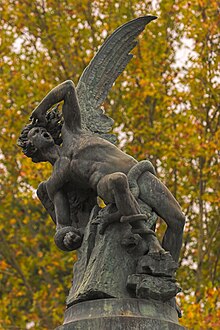
Back ملاك ساقط Arabic Düşmüş mələklər Azerbaijani Паднал ангел Bulgarian Padlý anděl Czech Falden engel Danish Höllensturz German Falintaj anĝeloj Esperanto Ángel caído Spanish Langenud ingel Estonian Aingeru gaizto Basque

Fallen angels are angels who were expelled from Heaven. The literal term "fallen angel" does not appear in any Abrahamic religious texts, but is used to describe angels cast out of heaven[1] or angels who sinned. Such angels often tempt humans to sin.

The idea of fallen angels is derived from the Book of Enoch, a Jewish pseudepigraphic apocalyptic religious text, or the assumption that the "sons of God" (בני האלוהים) mentioned in Genesis 6:1–4 are angels. In the period immediately preceding the composition of the New Testament, some sects of Second Temple Judaism identified these same "sons of God" as fallen angels. During the late Second Temple period the Nephilim were considered the monstrous offspring of fallen angels and human women. In such accounts, God sends the Great Deluge to purge the world of these creatures; their bodies are destroyed, yet their peculiar souls survive, thereafter roaming the earth as demons. Rabbinic Judaism and Christian authorities after the third century rejected the Enochian writings and the notion of an illicit union between angels and women producing hybrids. Christian theology indicates the sins of fallen angels occur before the beginning of human history. Accordingly, fallen angels became identified with those led by Lucifer in rebellion against God, also equated with demons.
In Islam, belief in fallen angels is disputed. In early Quranic exegesis (tafsīr) there are two distinct opinions in regards of the obedience of angels, often revolving around the nature of Iblis (Satan in Islam).[2] According to the viewpoint of ibn Abbas (619–687), Iblis was an angel created from fire (nār as-samūm), while according to Hasan of Basra (642–728), he was the progenitor of the jinn.[3][4] Hasan al-Basri argued that angels are unable to sin. To eliminate the possibilities for fallen angels, he further interpretates Harut and Marut, mentioned in 2:102, as malikayn (kings) instead of malā'ikah (angels).[5] Ibn Abbas, on the other hand, asserts that the verse in Surah 18:50 "except Iblis, he was one of the jinn", means "he was one of the inhabitants of paradise" and generally allows the concept of fallen angels within Islamic tradition.[2]
Historians have discussed the relationship between Quranic jinn and fallen angels in Christian theology. Some of the primary issues for such a relationship is that the former are not identified as "angels" and that, unlike angels, they are described as ascending to the sky where they eavesdrop on heavenly secrets.[1] In classical Islamic traditions, the jinn are often thought of as a race of Pre-Adamites, who dwelt on earth.[6]
- ^ a b Crone, Patricia (2016). "QS 41 Q 72: Crone". In Azaiez, Mehdi; Reynolds, Gabriel Said; Tesei, Tommaso; Zafer, Hamza M. (eds.). The Qur'an Seminar Commentary / Le Qur'an Seminar: A Collaborative Study of 50 Qur'anic Passages / Commentaire collaboratif de 50 passages coraniques (in French and English) (bilingual ed.). De Gruyter. pp. 387–390. ISBN 9783110444797. ISBN 3110444798
- ^ a b Erdağı, Deniz Özkan (1 February 2024). "Evil in Turkish Muslim horror film: the demonic in "Semum"". SN Social Sciences. 4 (2): 1–22. doi:10.1007/s43545-024-00832-w. ISSN 2662-9283.
- ^ Akbari, Mahtab, and Reza Ashrafzadeh. "A comparative study of the image of the devil in the logic of Attar Attar and the commentary of Abolfotuh Razi." Propósitos y representaciones 9.2 (2021): 100.
- ^ Öztürk, Mustafa. "The Tragic Story of Iblis (Satan) in the Qur’an." Journal of Islamic Research 2.2 (2009): 128-144.
- ^ Al-Saïd Muhammad Badawi Arabic–English Dictionary of Qurʾanic Usage M. A. Abdel Haleem ISBN 978-90-04-14948-9, p. 864
- ^ Amira El-Zein Islam, Arabs, and Intelligent World of the Jinn Syracuse University Press 2009 ISBN 978-0-8156-5070-6 p. 39
© MMXXIII Rich X Search. We shall prevail. All rights reserved. Rich X Search